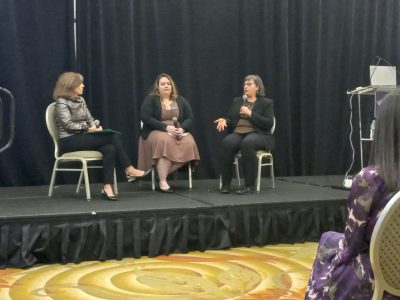Neighbors Link Event Addresses Unaccompanied Minors Coming to U.S.
News Based on facts, either observed and verified directly by the reporter, or reported and verified from knowledgeable sources.

Drugs, ruthless gangs, the threat of death and unrelenting poverty in Central and South America have been among the chief reasons why another record number of migrants reached the United States during the past year. Records were also anticipated to be broken for the number of unaccompanied minors, with at least 160,000 were expected. They travel in groups often riding the tops of freight trains through Mexico in a desperate attempt to reunite with parents or other relatives who had previously migrated to set down roots and make some money, said Pulitzer Prize-winning writer Sonia Nazario.
Whether it’s corrupt or incompetent officials in those countries, the gangs have often become the de facto government, Nazario said.
“The government doesn’t exist in many of those neighborhoods,” she said. “It’s the gang and they force you at nine or 10 years old to work for the gangs, or if you’re a girl, to be the gang leader’s girlfriend.”
Nazario was the featured speaker last Wednesday at the Neighbors Link-sponsored program “Seeking Safety: Unaccompanied Minors and U.S. Immigration Policy” at the Sleepy Hollow Hotel and Conference Center in Tarrytown.
Nazario won the Pulitzer for her multipart series that appeared in The Los Angeles Times following Enrique, a Honduran teenager who was left by his mother at five years old to be raised by his maternal grandmother while she worked in North Carolina. After 11 years, he traveled from his native land to see his mom. The series was the basis for her book, “Enrique’s Journey,” originally published in 2006.
“At 11 and 12 (years old) on Christmas Day, he told me, he stood at the door of his grandma’s wood shack and we would put his hands together in prayers and ask God…bring her back to me,” said Nazario, who traveled with groups of migrants on the tops of trains for two three-month stints.
Over the decades there have been hundreds of thousands of youngsters like Enrique, she said. But it’s been since 2014 when the floodgates of unaccompanied minors opened. Previously, 6,000 to 8,000 were the norm in a typical year, Nazario said.
“It’s because of the violence in Central America, in Mexico,” Nazario said. “The majority now are coming not from Mexico, Central America in the last two or three years, it’s been Venezuela, Africa, Guatemala, Ecuador. So there’s been a shift from single Mexican men historically to families and children from Central America.”
And it’s also been the result of the absence of an effective U.S. policy. The country spends about $23 billion annually on border patrol but can’t stem the tide of migrants.
Nazario said the U.S. should try to address the crisis at the border with several steps. First, examine what is pushing people out of their native countries. The U.S. should be a leader in reducing violence, weeding out corruption and strengthening the government institutions. About 96 percent of homicides in those countries go unsolved.
Second, while working on the long process of making positive changes in South and Central America, the U.S. must show compassion to children and let them in and change the laws so they are entitled to representation at Immigration Court. Nazario said she has seen children as young as seven years old by themselves in court.
“If a child knocks on our door and arrives at a country like ours, I believe we should always open that door, especially children from our neighbors,” Nazario said. “Countries like the U.S. have not had a small role in fueling much of this mayhem.”
Finally, having more organizations around the country that are like the Mount Kisco-based Neighbors Link, which provides English classes, work opportunities and other services to help integrate the new arrivals into the country.
Elizabeth Mastropolo, one of six attorneys who work for the Neighbors Link Community Law Practice, said whatever harrowing journeys migrants have to get to the United States, is worth the risk.
“These families are coming here because they fear death and torture in their home countries,” Mastropolo said. “The opportunity as a parent to have their children someplace safe, that’s all they want. They want their children to be safe and if that means being separated from them, if you can get them to a safe place, then that’s what they have to do.”

Martin has more than 30 years experience covering local news in Westchester and Putnam counties, including a frequent focus on zoning and planning issues. He has been editor-in-chief of The Examiner since its inception in 2007. Read more from Martin’s editor-author bio here. Read Martin’s archived work here: https://www.theexaminernews.com/author/martin-wilbur2007/
